Medialab Prado is a citizen laboratory that functions as a meeting place for the production of open cultural projects. It is a cultural space and citizen lab in Madrid. It was created by the Madrid City Council in 2000, growing since then into a leading centre for citizen innovation. The Medialab’s activities are structured in working groups, open calls for the production of projects, collaborative research and learning communities around very diverse topics. After the 2019 local elections, the centre’s relationship with the municipality became more distant. In 2021, the municipality did not renew the contract of the Medialab’s director and announced that it would move the institution to a new location, prompting protests among civil society as well as the artistic and scientific communities of Madrid. In this interview, former communication officer of the Laboratories of Citizen Innovation Bernardo Gutierrez shares his experiences in the organisation.
Can you describe Medialab Prado?
Since 2002, Medialab Prado has been a public cultural centre interested in citizen innovation, commons and connecting citizens in space. It is also an open space for digital hacker culture, where citizens can develop projects and activities with a free software approach. In the last seven years, since moving to its new building in central Madrid, it has become a key institution in Madrid’s cultural landscape. Medialab Prado is one of the places where commoners, squatters, institutions and citizens meet to think about how to organise themselves and innovate the city. Many projects of the city of Madrid were created in Medialab and not in the City Hall. To understand the origins of Medialab Prado, it is important to know that the hacker culture and the copyleft movement in Spain are quite strong, even the traditional cooperative movements have engaged with the creative commons and copyleft principles. Medialab Prado was born from this movement.
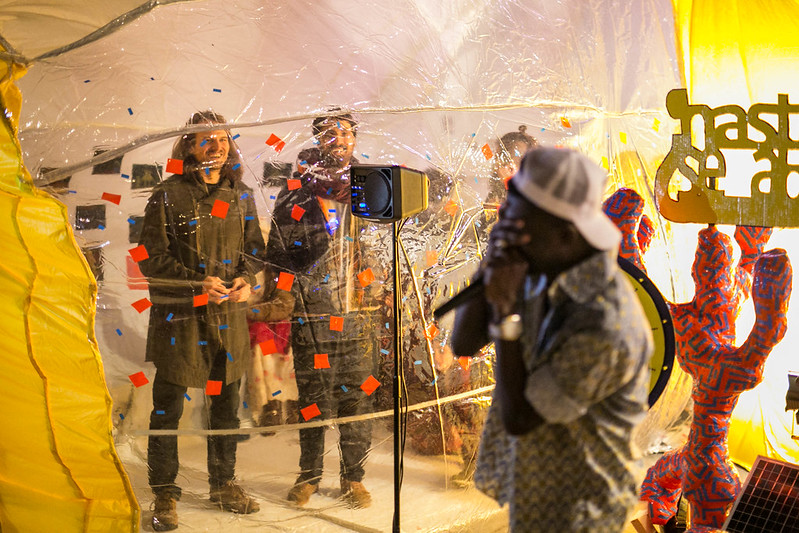
How has the network around Medialab Prado evolved during the years?
The history of Medialab goes back to 2002 and is quite long. The initial community was made of pro-commons, hackers and activists from social centres and the right to the city working on urban issues. After 2011 and the Indignados movement, Medialab grew a lot and got a big building in the centre of Madrid. About 30% of the building was open to all people, unlike most public institutions. Medialab is like an incubator of communities where anyone is welcome and can speak about anything.
In the period from 2011 to 2015, a lot of civic organisations, NGOs, institutions and academics met there. The pre-municipalist situation, I think, was more interesting than the municipalist period of Medialab, as it attracted a larger variety of actors. After 2015, since the start of the collaboration with the City of Madrid, the communities changed. You would see more institutions, foundations, governmental actors, people working on citizen innovation frameworks and open government. A lot of social movements, who were present before, moved to social centres, thus Medialab lost the initial community. However, despite around 80% of its funding coming from the City of Madrid, Medialab always had the ambition to keep a certain level of autonomy.
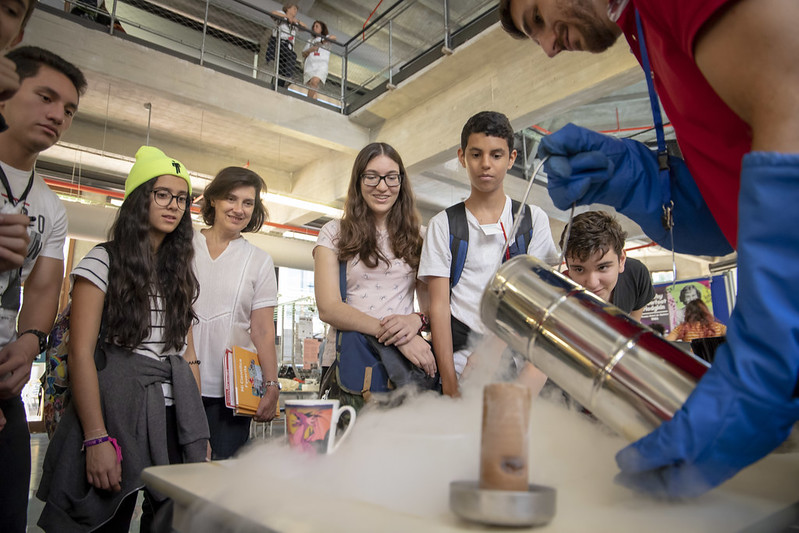
There is a continuity of actors, of course. Moreover, Medialab Prado has also evolved into an international actor in the movement of citizen innovation labs. It has a partnership with the SEGIP, the Ibero-American General Secretariat, but also with 23 different countries such as Spain, Portugal and many others in Latin America. Medialab Prado is the key player in the citizen innovation labs of these 23 countries. They go to Columbia, Brazil, Mexico and many other countries to do citizen hackathons and build innovation labs.
How did the work of Medialab change through the collaboration with the City Hall?
When the collaboration with the City Hall started back in 2015, Medialab Prado’s team grew bigger to include a total of 20 people working together on issues mainly related to Open Government and participation. The seven new additions to the team were responsible for 6 new citizens’ labs (laboratorios ciudadanos). Initially the idea was to only create three new labs: the Citizen Innovation Lab, the DataLab and the ParticipaLab. The main budget went to the ParticipaLab, as 50% of it came from the participation secretariat of the City Hall. I can say that most of the things we did during that period were through ParticipaLab and Decide Madrid. The relationship of this lab with the municipal secretary of participation was kind of privileged, for the main interest for the City Hall was to create a participation lab. In fact, the main reason why Medialab was chosen as a partner is for its incredible work on issues related to transparency and open data, something that the local government was really interested in at the time. However, Medialab finally succeeded in creating six labs in total, in order for the collaborative actions to be more aligned to its philosophy. The additional three labs were the AvLan (more linked to arts and digital culture a l), the CiCi Lab (a kind of Citizen Science Lab) and the PrototipaLab linked to the Fab Lab.
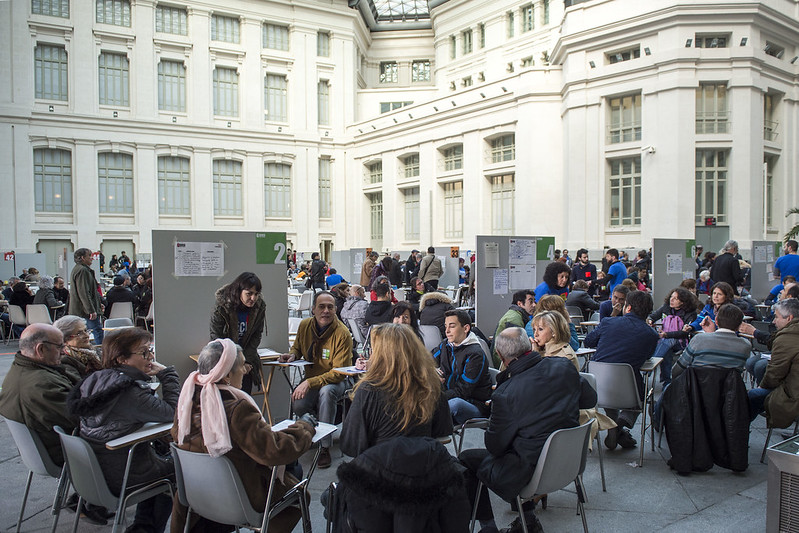
The difference of working inside or outside public administrations is very important. Through a direct collaboration with the City Hall, we realized that we could improve and change things, like introducing mapping, big data, new events to the municipal agenda and invite people to make unique proposals. In many instances, projects that were conceived within events and workshops organised by Medialab have been considered for public policy. This is true not only in Madrid, but in many other cities in Spain and abroad. La Escalera, for example, is an amazing project. Some users of Medialab thought they did not know their neighbours and did not speak with anyone in their building – they prototyped some stickers to glue on the stairs of their building. Stickers had sentences like ‘life is a problem that we have in common. Why don’t we solve it as a community?’ Or, ‘I share my wifi’, ‘I can water your plants’, ‘I can shop for you’; there are now more than 20 buildings of the city working with such initiatives, testing, speaking with neighbours on how to transform the whole building into a community as it was 100 years ago. The previous local government did what we call ‘virtuous public procurement,’ buying services from an independent provider because it’s for the common good. They supported this project and sent the stickers by mail to all the citizens of Madrid. It was kind of a revolution.
What was the working methodology of the labs?
The labs worked through prototyping workshops (talleres de prototipado). These were international workshops and when I worked in Medialab there have been five of them, one for each Lab. Actually, the Prototipa Lab and Citizens Science Lab organised one common workshop. The other workshops were Active Intelligence for Democracy with ParticipaLab, Experimenta Distrito with InCiLab and Interactivos.
The methodology of the workshops is simple. It all starts with an open call for projects, putting a projectual frame for each workshop. We received around 150 projects for each lab and then only around eight projects were chosen to participate. Four or five mentors would always be there to evaluate the projects. When a project is selected, the applicant takes the role of project coordinator inside the workshop. I think almost 70% of the projects came from Spain, the rest mainly from Europe, Latin America and Africa. Once the selection process is completed, the international workshops take place over two weeks and the scope is to put a diversity of people together to create project prototypes. The philosophy of Medialab is to bring together people from different backgrounds creating a multidisciplinary and diverse working group. Informal knowledge is also valued in this sense. In each working group of 8-10 people, there are usually 1-2 people that are comfortable with technology and innovation, like hackers, developers and designers. Medialab does not pay participants but provides food and accommodation in Madrid. The only people who get paid are mentors.
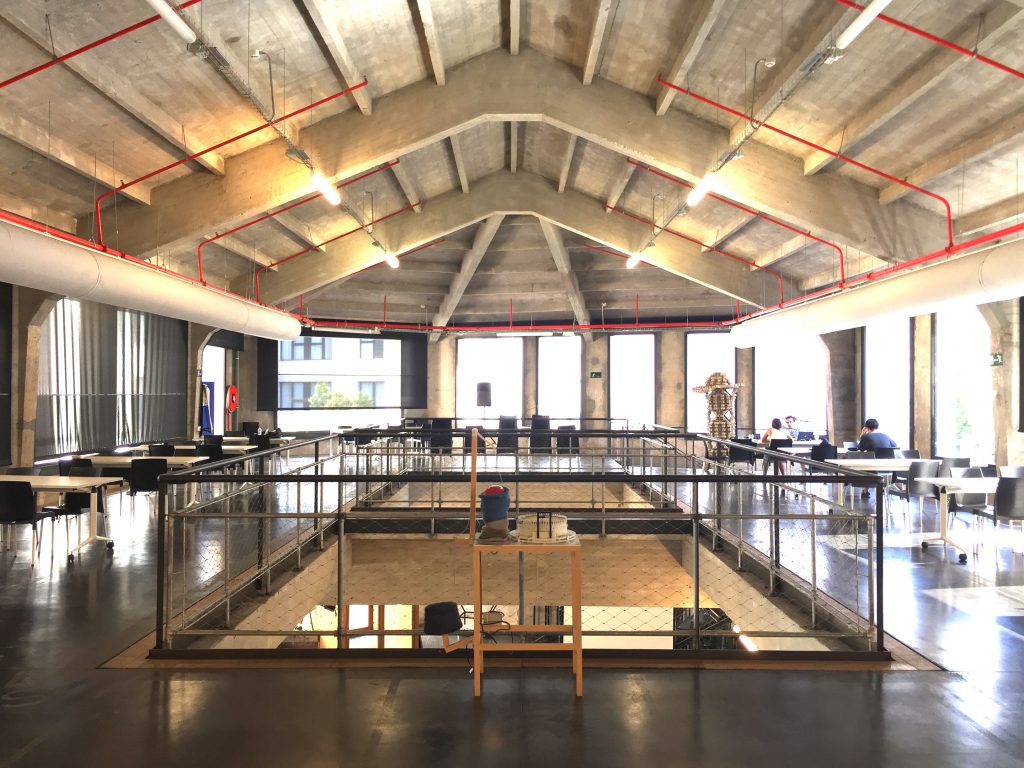
Prototyping projects are difficult to implement but the methodology we implemented for the collective intelligence for democracy workshop came out as a success. From each prototyping workshop there are about 50-60 projects that emerge. But most of them, I would say 50% die shortly after the workshop. It is very difficult to start a project and find the resources. I’ve seen a lot of projects taking shape in workshops but then they might easily not succeed or go ahead. Such kinds of events were common during the years of collaboration with the City Hall. We had more money, mentors and mediators. The availability of funding allowed us to organise bigger workshops with more guests.
How did you reach communities farther from Medialab’s central location?
Medialab Prado is in the centre. However, in order to reach a vaster population, we began to experiment in a diversity of districts for collaborative projects. Experimenta Distrito and Madrid Escucha have to do with territories, neighbourhoods that are not in the centre of the city. Medialab Prado is in touch with these areas through about 90-100 neighbourhood cultural centres, mostly small ones. In fact, these areas often have a different approach to citizen participation and it’s interesting to see how the same concept evolves and is appropriated by the population in different areas.
How did the interaction between social innovators and public servants work?
We did a kind of juridical Innovation lab in 2016 in which we put public servants together to think how to hack laws, how to be faster, how to find the path. But it was an initial project, we definitely need more action in that sense. Another interesting project implemented by Medialab Prado and including public servants was Madrid Escucha. It was an open call to put together public servants and citizens without the mediation of politicians. The workshop was meant to produce prototypes of projects to be implemented. More or less 30% of the projects came from the public servants, 70% came from citizens. In total, we had 10 projects. Madrid Escucha was a very interesting project investigating how to be proactive and apply a faster problem solving approach inside public institutions, which is very difficult. However, it seems like public institutions are made to be dysfunctional. It seems like the trend is still to invest money in big companies and not in cooperatives. The previous councillor for economy, Carlos Sánchez Mato, tried to hack the City Hall’s contracting laws, to put the social economy and the common good as a central concern. During the previous administration we got to the point where the social impact of projects was more important than it being the cheapest proposal. However, this is not the case anymore under the new administration.
Could you tell us a bit more about some of the projects you followed in Medialab?
I was mainly responsible for the communication of the Citizen Innovation Lab. Personally, I worked with projects related to storytelling, the website and the graphic identity of Medialab from within the Citizen Innovation Lab. Reframing the graphical and storytelling identity of Medialab was something they had never done before and we did it together for 3 years. I would say it definitely helped Medialab become an international innovation hub with hundreds of other cities approaching us to help create new labs all around the world and especially in Latin America.
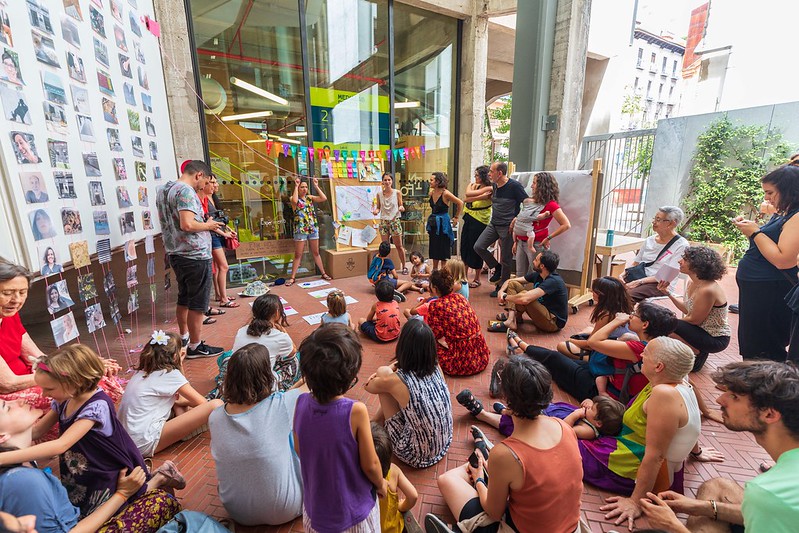
As my main interest at the time was to try to bridge a gap between storytelling and participatory platforms, one of the main projects I was responsible for is the storytelling work of La CocTELLera. It is a fun and different way of doing proposals. You don’t need to be alone in your house doing a proposal, you can come and meet people, you have designers, storytellers, activists, a lot of people thinking together how to do nice proposals and doing campaigns together. The objective was to work on the symbolic value of citizens participation and create communication material through a transmedia approach.
How has the end of its collaboration with the City Hall impacted the work of Medialab?
Having worked with them for three years, I think I can state that Medialab Prado is aware of the fact that the nature of its action leads to a constant interaction with political ideologies and politicians. Despite it being a more leftist organisation, it has dealt and continues to do so with centre, liberal, centre-right parties. The four years of collaboration with the City of Madrid between 2015-2019, was hence a time of experimentation and it was clear that it would have come to an end. Medialab was not only expecting it but it was also ready for it.
Madrid is a big capital city and you have many levels of power. You have the autonomous social centres and independent spaces, you have the city hall level, the Region of Madrid, the central government, international and European institutions, Ibero-american institutions, cultural centres, etc. It is thus not easy to govern Madrid, and we can say that no one controls it and that is good. The space of Medialab is more than a city-level actor, it is an international-level actor. Its team had a very important international influence and also received international support. There are many labs created in Latin America that were inspired by Medialab. So the place of Medialab goes beyond the municipality. Today, more or less 20% of the institution’s total budget comes from the EU and other international foundations. Even with the change of City Hall and with a secretary of culture as an adversary of the Medialab, it would still be difficult to end all of Medialab’s activities. The resilience of Medialab favoured its resistance to any change at the political level. Of course there has been one important change inside Medialab Prado as seven people who were working as part of the team (including me) had to step out after the three years contract with the City Hall. Today, for Medialab, the fact of being again a smaller team is helping them going back to their initial activities of prototyping, open calls, etc.
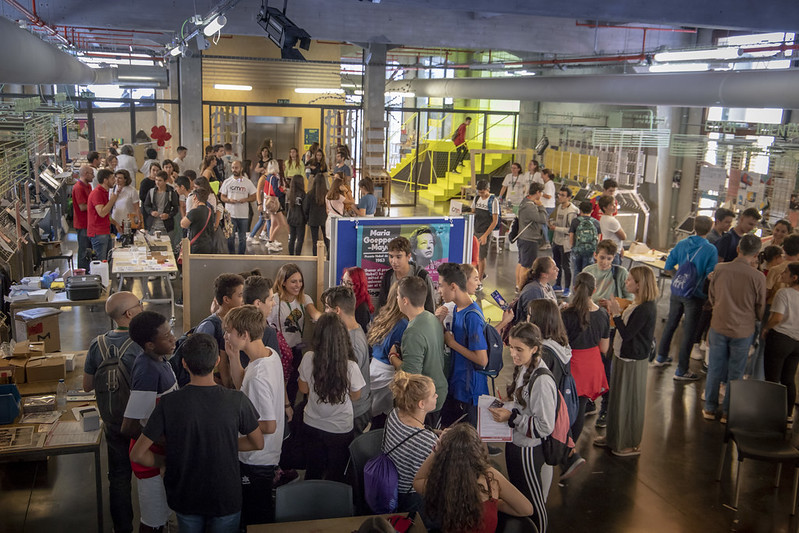
How has Medialab been doing in the last months?
In the years following the start of the collaboration with the City Hall, 80% of the things that have been done in Medialab were through the new labs and the extra six people who came to join the team funded by the participatory secretariat. With these funds no longer available, Medialab had to go back to smaller events. In the same time, I could have never imagined the events of the past months: the new City Hall, with strong right wing convictions, is trying to kill and dismantle Medialab Prado. This operation against Medialab is situated in a broader strategy to eliminate all Madrid citizen hubs that promote participation. The local government even tried to evict Medialab Prado from its current headquarters, despite this putting at risk Madrid’s candidacy of the Prado area as a UNESCO World Heritage site. There has been a strong reaction from the side of the broader public and the campaign #WeAreTheLab seems to have stopped the plan of moving Medialab Prado to a smaller and more peripheral venue. Nevertheless, all international support to help our case is welcome.
Interview with Bernardo Gutierrez, journalist, media consultant, writer, art researcher and former communication officer of the Medialab’s Laboratories of Citizen Innovation.
This article appears in the book The Power of Civic Ecosystems: How community spaces and their networks make our cities more cooperative, fair and resilient.

